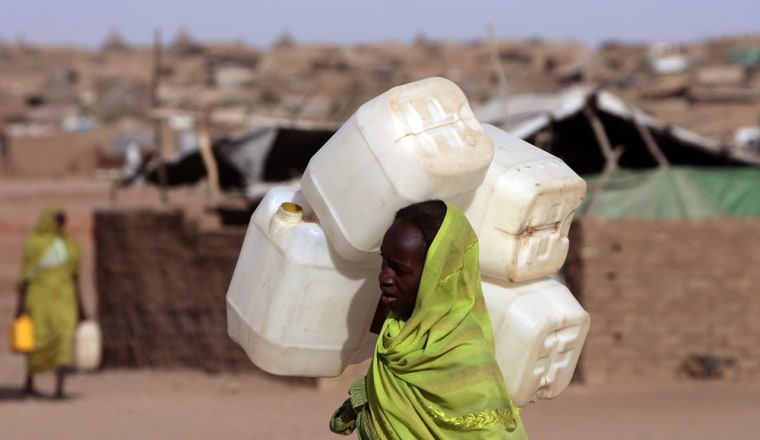New research on the conflict in Sudan's western Darfur region shows that more than 80 percent of the 300,000 deaths since fighting began in 2003 were the result of disease, not violence.
The findings, published Friday in the medical journal The Lancet, suggest many among the millions of people uprooted by the conflict could remain at great risk of succumbing to the malnutrition, diarrhea and waterborne diseases that have ravaged their squalid refugee camps even as fighting has ebbed.
Fighting between rebels and Sudanese government forces began in Darfur in 2003, driving 2.7 million people from their homes and creating an enormous humanitarian crisis in the vast desert region. Sudan's government has said the casualty figures are exaggerated.
The violence has largely subsided, but banditry and kidnappings of foreign aid workers continue to plague efforts to stabilize the region.
Researchers at the Center for Research on the Epidemiology of Disasters at the Catholic University of Louvain in Brussels, Belgium, put together the study. They reviewed 107 mortality surveys from 2003 to 2008 and chose 63 that met all of the data requirements for their combined statistical analysis.
The study found the number of deaths from violence peaked in early 2004, a year after the fighting began with a rebellion by ethnic African tribes accusing the Arab-dominated government of neglect.
At the height of the conflict, government-allied militias known as the janjaweed burned down entire villages, government planes dropped bombs on populated areas and reports of rape by the gunmen abounded.
During that period, Darfur was called the world's worst humanitarian crisis.
Since 2005, most of Darfur's deaths have been the result of disease, and displaced people have been the most susceptible, the review found.
'Fear the worst'
Last March, Sudan's government expelled 13 of the most important international aid agencies working in Darfur in response to an international court's arrest warrant for President Omar al-Bashir on charges of war crimes and crimes against humanity in Darfur.
"The full effect of the expulsion of non-governmental organizations from Darfur is still not known, but the increased mortality rate during a period of reduced humanitarian deployment in 2006-07 suggests that we should fear the worst," the study's authors wrote.
The review found that during that period, from July 2006 to September 2007, there was an increase in the number of people dying from disease.
As a possible explanation, the report noted that around the same time, there was a 40 percent increase in the number of displaced people, an 18 percent drop in humanitarian aid personnel and a decline in funding for their work.
The study's figures do not take into account those refugees who fled across Sudan's border to camps in Chad. The review was funded by the U.S. State Department and Britain's Department for International Development.
Numbers debated
The reporting of Darfur casualty figures by aid groups and international agencies has generated debate in the past, with Sudan's government accusing its critics of exaggerating the overall numbers of dead and the extent of atrocities.
Most recently, the previous U.N. peacekeeping chief in Darfur pointed in September to the sharp decline in deaths from fighting in the first half of 2009 and said the world should no longer consider the conflict a war.
Activists and some residents of Darfur disagreed and expressed concern that the comments by Rodolphe Adada would sap the momentum of an international aid effort that remains crucial.
